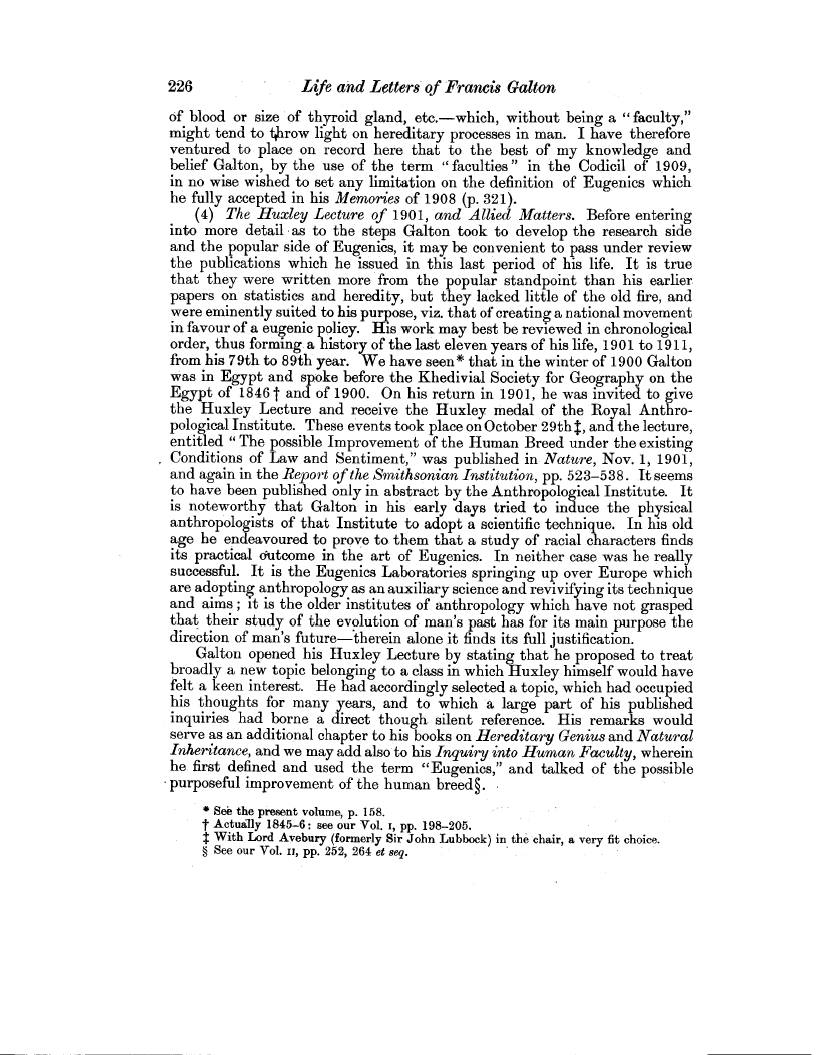| ||||||

OCR Rendition - approximate
226 Life and Letters of Francis Galton of blood or size of thyroid gland, etc.-which, without being a "faculty," might tend to throw light on hereditary processes in man. I have therefore ventured to place on record here that to the best of my knowledge and belief Galton, by the use of the term " faculties " in the Codicil of 1.909, in no wise wished to set any limitation on the definition of Eugenics which he fully accepted in his Memories of 1908 (p. 321). (4) The Huxley Lecture of 1901, and Allied Matters. Before entering into more detail as to the steps Galton took to develop the research side and the popular side of Eugenics, it may be convenient to pass under review the publications which he issued in this last period of his life. It is true that they were written more from the popular standpoint than his earlier papers on statistics and heredity, but they lacked little of the old fire, and were eminently suited to his purpose, viz. that of creating a national movement in favour of a eugenic policy. His work may best be reviewed in chronological order, thus forming. a history of the last eleven years of his life, 1901 to 1911, from his 79th to 89th year. We have seen* that in the winter of 1900 Galton was in Egypt and spoke before the Khedivial Society for Geography on the Egypt of 1846 f and of 1900. On his return in 1901, he was invited to give the Huxley Lecture and receive the Huxley medal of the Royal Anthropological Institute. These events took place on October 29th l, and the lecture, entitled " The possible Improvement of the Human Breed under the existing Conditions of Law and Sentiment," was published in Nature, Nov. 1, 1901, and again in the Report of the Smithsonian Institution, pp. 523-538. It seems to have been published only in abstract by the Anthropological Institute. It is noteworthy that Galton in his early days tried to induce the physical anthropologists of that Institute to adopt a scientific technique. In his old age be endeavoured to prove to. them that a study of racial characters finds its practical outcome in the art of Eugenics. In neither case was he really successful. It is the Eugenics Laboratories springing up over Europe which are adopting anthropology as an auxiliary science and revivifying its technique and aims ; it is the older institutes of anthropology which have not grasped that their study of the evolution of man's past has for its main purpose the direction of man's future-therein alone it finds its full justification. Galton opened his Huxley Lecture by stating that he proposed to treat broadly a new topic belonging to a class in which Huxley himself would have felt a keen interest. He had accordingly selected a topic, which had occupied his thoughts for many years, and to which a large part of his published inquiries had borne a direct though_ silent reference. His remarks would serve as an additional chapter to his books on Hereditary Genius and Natural Inheritance, and we may add also to his Inquiry into Human Faculty, wherein he first defined and used the term "Eugenics," and talked of the possible purposeful improvement of the human breed § . * See the present volume, p. 158. t Actually 1845-6: see our Vol. i, pp. 198-205. With Lord Avebury (formerly Sir John Lubbock) in the chair, a very fit choice. See our Vol. n, pp. 252, 264 et seq.
|